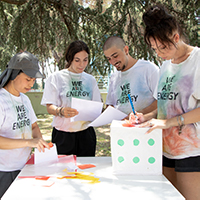Formators in Consecrated Life
PresentationBack to top
This Course is aimed at consecrated persons in the field of initial and ongoing training, and qualifies them for accompaniment and vocational discernment roles.
AimsBack to top
The annual Course for Consecrated Life Formators aims to meet the demand for quality formation, offering well-structured and unified teaching that follows the Gospel and is open to new forms of formation.
It aims to promote the spirituality of the communion, translating it into an educational principle for places of learning, in particular places dedicated to consecrated life.
Learning outcomesBack to top
At the end of the Course of study, students must demonstrate:
- a knowledge of topics related to consecrated life, involving vocational discernment and formation of candidates;
- their ability to assess and alter their own personal development pathway and their formational skills;
- their ability to plan and organise vocational orientation, discernment and accompaniment pathways;
- their ability to plan, implement and assess a plan for the various stages of formation;
- their ability to organise and coordinate the methodological and relationship aspects of training.
Target recipientsBack to top
The Course is aimed at those already working in the field of consecrated life formation or those preparing to enter it, in animation and/or coordination roles.
Diploma and training creditsBack to top
A diploma is issued to those who have attended the entire Course and completed the assessments.
Structure and organisationBack to top
The Course lasts one year.
It is split up into six theoretical, theoretical/practical and experience-based modules, and includes personalised tutoring throughout the course, aiming to promote personal integration and the development of the attitudes required in formation relationships and providing supervision for the development of formation plans.
As well as lessons and exercises, the course also includes work experience and in-depth seminars.
Methods
The theoretical and practical modules are taught with an interdisciplinary and intercultural perspective.The interdisciplinary units begin with theoretical and critical reflection, and are taught using a range of methods: study groups, seminars, presentations of personal experiences, case study discussions etc.
The experience-based modules involve workshops, exercises and sharing of the unique charismatic features of the individual Salesian institutes.
Assessment
Each module includes an assessment to encourage assimilation of the contents and their inclusion in the students’ educational pathway.Teaching and learningBack to top
Theological area
- Vocational profiles in the Bible
- The mystery of Christ, the supreme rule and authority of consecrated life
- The dynamics of life in the presence of the Holy Spirit
- The mystery of the origins of the church and in its multiple vocations and charismas
- Consecrated life
- Mary of Nazareth in the formational pathway
- The role of consecrated women in the construction of a new humanism
Pedagogical-pastoral area
- Youth ministry and vocational ministry
- Vocational discernment
- Spiritual direction and vocational accompaniment
- The formation community, subject to discernment and planning
- Planning formative interventions and developing the formation plan
Sociological area
- Elements of sociology in religious life
- Group dynamics and community animation
Psychological area
- The psychology of consecrated life
- The dynamics of personal conversation in vocational accompaniment
- Aspects of psychopathology in spiritual and religious life
The units are split into six modules and have a multidisciplinary structure. Each module will study certain subjects in depth, with an interdisciplinary approach:
- Evangelical advice as a follower of Christ
- Relationships and sexuality in consecrated life
- Communication and culture: implications for training for consecrated life
- Discernment and vocational psychodiagnosis
- The prophecy of consecrated life for the third Millennium
Admission requirementsBack to top
To enrol on the Course an upper high school diploma or a degree/diploma and some experience in formation are required.
Those who cannot follow the entire Course or do not meet the admission requirements may attend certain modules as an auditor.
RegistrationBack to top
To get the registration, the following documents must be presented:
- a photocopy of the student's passport or another document that gives their real first name and surname;
- original high school diploma along with a declaration stating that the diploma is valid for university admission in the country where the high school is located. This declaration, in Italian, must be given by the diplomatic authority or the Italian consulate from the country in which the diploma was awarded;
- a residency permit in Italy for students;
- a written declaration from the Superior authorising the registration of a religious student;
- a passport-size photograph;
- a completed application form, provided by the registrar's office;
- a receipt proving the first tuition payment was made;
- authorisation from the Dean.
AttendanceBack to top
Lessons begin in January and finish at the end of May
They take place from Monday to Friday from 8.30 am to 12.00 pm.
Attending lessons is compulsory.
Study seminars and work experience take place in the afternoon or as weekend activities, as set out in the schedule.
Students can attend one or more modules, with a certificate of attendance awarded at the end.
CoordinationBack to top
FARINA Marcella






